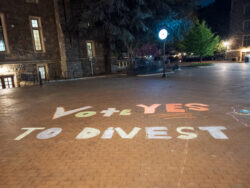The Voice sat down with GUSA executive ticket Nico Ferretti (SFS ’21) and Bryce Badger (MSB ’21) to discuss their past experiences in GUSA and their platform of sustainability, inclusivity, facilities, and sexual assault prevention ahead of the GUSA Executive election on Feb. 6.
This interview has been edited for clarity and length.
The Voice: So could you guys just first off, tell me a little bit about yourselves and what you’ve done at Georgetown since you got here to start.
Nico Ferretti: Hi, I’m Nico. I’m a junior in the SFS. I’m studying Science, Technology, and International Affairs with a concentration in energy and environment. I’m an Arabic minor. I’m really into science policy, especially in the energy and environmental realm. On campus, I love athletics. I’m a big Hoyas fan, and I try to go to get as many basketball games as possible. I like being in Reventón and Rangila, and I’ve done Cornerstone a couple times. And then I’ve been in GUSA now since my freshman year. Most of my early work involved trying to lower the cost of meal plans at Leo’s and increasing vegetarian options. I started expanding my role and got involved more in accessibility projects and transportation, and because [of] that I kind of ended up on the exec in my current position. I am now director of university affairs in the Francis-Olvera administration. I oversee our sustainability technology, Res Living, dining, accessibility, and transportation teams.
Bryce Badger: My name is Bryce Badger. I am a third year in the business school, double majoring in Marketing and Global Business and double minoring in Japanese and Economics. My pronouns are they or he. I’m originally from Orlando, Florida. I’m in AASA. I’m in GAMBLE. I’m writing the Blaxa now, which is the black newspaper. And then I’m also working on the BUILD pre-orientation program, and that’s an orientation program to get first years and transfer students oriented on campus before NSO starts. So a lot of organizations, but I think the reason why I’m involved in all of them is because when I first got to Georgetown as a person of color, as a queer person, it was a lot of things to learn the ropes. And I felt like these were the communities that I matriculated in best and was able to find my support systems and my people that I call my family now on campus. And so I’ve been involved in them ever since, because they were where I felt most at home or most confident in myself.
TV: Why would you say you are running?
BB: I’ve been involved in GUSA since my first year at Georgetown, and I’ve been in a lot of different positions within organizations. So I think I have a lot of institutional knowledge. I think we make a really great [team] because we have that knowledge, and because we can work with different people from all across GUSA and all across campus. We’re also able to reach out to people who aren’t involved in GUSA currently to make sure that we’re constantly connecting with them and engage with the student body.
NF: I think that’s a really good point, because when I first got involved in trying to make dining better, the biggest obstacle was almost no one knew what was going on. I think there’s just so much ignorance and such a lack of transparency shrouding the way Georgetown actually works. So I think having people in charge who actually have kind of experience with that is super helpful, because in the end the people who are going to make the most change are not going to be Bryce and I. It’s going to be policy chairs. It’s going to be other advocates who really at a certain point just need someone to help show them the ropes and help like understand how to navigate Georgetown administration, because it can be a labyrinth. It really can. At a certain point, getting things done does require institutional knowledge.
TV: Can we get into your platform? What issues are you guys focused on?
BB: Our campaign is built on three core values: being proactive, being realistic; recognizing and embracing intersectionality; and then owning who we are. Being proactive and realistic: we’re not promising things that aren’t gonna be able to be done or [would be] huge lifts for one administration. A lot of this stuff is stuff that we’ve been working on, and it’s feasible in the short- term. Recognizing and embracing intersectionality: a lot of these issues often come up through GUSA’s eyes as mono-dimensional, but they all intersect. Recognizing and working to address that is really important to me just because as a queer person of color, I’ve seen that a lot on campus. And then finally owning who we are. We say a lot of things and we take a lot of stances, and I think it’s important that we stand by what we do and how we say things. We have four key focus areas. The two that I’m really passionate about are affiliated with an inclusive campus and preventing sexual assault on campus. Also improving sustainability and improving facilities on campus.
NF: Sustainability kind of had to be one of our platforms. I love working on environmental policy. It’s been the thing I’ve been the most excited to learn about Georgetown and most excited to work on. And we have a couple of great sustainability policy advisors on the team who’ve been super helpful in figuring out how we want to approach making Georgetown more sustainable. Right now we have kind of three big goals, which are more sustainable vehicles, pursuing a new solar farm, and the last one is 50 percent renewable electricity. That was kind of natural because it’s something the team has experience with and something I was passionate about. And then facilities is kind of just constantly an issue at Georgetown.
BB: One thing that really was important for us was keeping in mind the different issues that impact people on campus. So building an inclusive campus, comes out to racial, cultural, politically inclusivity, LGBTQ advocacy, gender equity and also religious inclusivity. One thing that was really passionate for me when we were building up this platform was LGBTQ and socioeconomic inclusivity. My first year at Georgetown, I had just come out and I was kind of terrified to go home. Over winter break, when I was making the decision whether or not to go home, I was like, ‘how am I going to stay or I would be able to stay on campus?’ And so one key idea that we have is working with Res Living and then HoyaHub to make sure that students who either aren’t comfortable going home or aren’t able to go home are able to stay on campus and also have resources on campus, so that they are able to feel comfortable and supported.
TV: How would you implement some of these policies and what do you think would be the greatest challenge?
BB: Right now a key portion of our platform is pushing for the Title IX office to hire more people of color and more queer people. One thing that’s going to be an issue with that is because the university takes a lot of time hiring these positions. Those processes sometimes take more than one year, whereas the term would be one year. So setting that up for success for administrations in the following years are able to continue.
NF: And making sure it’s transparent.
BB: Exactly. That’s probably what I see being the large issue because they can wait us out, whereas we have some urgency. We have to make sure that we are keeping that in mind throughout the term.
TV: You guys are obviously very big in the current administration and in your current positions. So how do you think this year went? Kind of grade yourselves. How do you guys feel like you did in trying to implement policy?
NF: So I was actually very pleasantly surprised. Norman and Aleida first of all—considering they came in not knowing anything about what it’s like to run an organization like GUSA, and there was like a huge learning curve. They get it insanely well. They put together proposals that past administrations would’ve taken months to put together. And we’ve had a lot of things actually go through. Like Capital Bikeshare; we got that done this summer. I feel like other administrations would’ve taken at least a year, like their whole term to do that. So I was very happy. GUSA is an organization that moves very slowly. The fact that it actually got some huge projects done and was able to do that while kind of keeping a healthy culture that prioritized mental health. I’m going to give us an A minus. I’m hopeful.
BB: In terms of how we got projects through, we did really well. One thing that could have been improved was the fact that being in GUSA is a giant commitment, so sometimes work seems to fall through the cracks just because it slips your mind or [it’s] during exams. And so we were really passionate about making sure people had time to themselves, to recover. This prioritized our mental health, which we think was extremely important. I just wish we had either a better way of record-keeping or some way to make sure things got passed along so that we could keep projects going while they were on their breaks. This year, Norman and Aleida did a great job. They were engaged; they talked to people; and they were constantly working. And I’m really proud of them and honestly grateful to them because they made me more outspoken on these issues. And it’s made me a better leader, I think. And so I am going to give our administration a B plus. But like a higher B plus if that makes sense.
TV: So would you do anything differently if you guys are elected? What would you do differently moving forward?
BB: Making sure that projects are either on the cusp of being finished or are able to be finished in the next couple of months, like those get pushed through from year to year. Typically the GUSA execs will talk to each other a little bit, and then as soon as the other person leaves, it’s like it’s everything new, all new projects, all new priorities, all new initiatives. And it leads to projects starting and stopping and restarting three years later.
NF: Continuity is huge. I think the biggest things I want to change are kind of within, just relations within GUSA. I really want a good relationship with everybody in the Senate because the Senate does so much, and it’s such a big kind of pool of advocates. I feel like the relationship was very tenuous there, and I really don’t think it needs to be. I want to centralize. We have so many forms. Oh my God. I have so many complaints about surveys.
TV: What do you guys say to students out there who want something different, don’t want the standard people in GUSA continuing up through GUSA. What would you say to them?
BB: I would say that we are current people in GUSA, but we’re also our own ticket, and that will be our own administration. So while we had giant roles in the Francis-Olvera administration, we also have our own priorities and our own initiatives. While we want to continue some projects, we’re not just doing the exact same thing. We have new priorities. And we have new values.
NF: We also want to bring new people in. I’m always looking for ways to get people involved in GUSA, just because we really do need as many voices as possible. If you DM me or something and you’re like, ‘oh, I’m interested in this,’ I will give you a team. You can get a team. You can get a project going. It’s not something you have to apply for anymore. And I just want to make sure we continue that.
TV: This is something that you’ve touched on already, but do you plan to work with the administration and students on pressing issues like fossil fuel divestment—which you mentioned—Title IX, and GU272?
NF: I really sincerely hope that GUFF wins this referendum…they will have the full support of GUSA if we’re elected.
BB: And on 272. I know that a couple of months ago we got an email from the university like getting some movement, but not the exact things that we were wishing for. And so I would definitely want to work with the 272 advocacy team and the entire community of people who are in support of it, like even though the university has made some movement, like we’re pushing for them to implement it and it’s as close to our vision as possible.
TV: If you could play a song every time you entered a room what would it be?
BB: Mine is definitely “Sue Me” by Sabrina Carpenter. She is so powerful and out there, ready to go take on the world. That’s what I want to be, sorry not sorry.
NF: I am going to go with “Tainted Love” by Soft Cell. There’s no reason why, it’s a great song!






